Bangladesh’s history is defined by resilience, sacrifice, and the indomitable will of its people. Born in the crucible of one of the most brutal liberation struggles of the 20th century, the nation emerged in 1971 after enduring war crimes, genocide, and a fight for identity against the backdrop of oppressive governance by Pakistan. Bangladesh’s quest for independence was not just about creating a new political entity but a battle for the right to self-determination, cultural recognition, and democratic ideals. Over the past 54 years, the country has oscillated between democratic progress, economic achievements, and authoritarian setbacks. But today, under the reign of a newly appointed interim government, the question arises: is Bangladesh teetering on the edge of a rapid, ski slope-style decline, risking an Islamist takeover, losing strategic importance, and becoming an untouchable entity for regional and global stakeholders?
To fully understand the gravity of the situation, it is essential to delve into Bangladesh’s past, examine its socio-political trajectory, and assess the dangers that now threaten to obliterate its hard-earned gains. From its birth through blood and tears to the fragile state of affairs today, Bangladesh’s descent is not just a domestic concern but a regional and global issue that holds dire consequences for South Asian geopolitics.
The Liberation Struggle of 1971: A Beacon of Hope
The Bangladesh Liberation War of 1971 was not a conventional military conflict but a people’s movement against a systemic campaign of oppression, neglect, and exploitation carried out by West Pakistan (now Pakistan). For decades, East Pakistan (now Bangladesh) was treated as a colony, with its economic resources drained, its people politically marginalized, and its linguistic and cultural identity suppressed. The final straw came with the Pakistani military crackdown on March 25, 1971, known as Operation Searchlight, a brutal campaign of genocide, mass rape, and systematic elimination of Bengali intellectuals, political leaders, and ordinary civilians.
It was a moment that tested the resilience of the Bengali people. The subsequent nine months of war resulted in the deaths of over three million people, the displacement of ten million, and the destruction of countless villages and cities. Despite these overwhelming odds, Bangladesh emerged victorious as an independent nation on December 16, 1971. The joy of liberation was tempered by the war’s devastation, yet the country carried immense hope for a future built on principles of justice, equality, and democracy.
Early Struggles and Setbacks
The early years of Bangladesh’s independence were fraught with challenges. The war had left the country impoverished, its infrastructure destroyed, and its people traumatized. Sheikh Mujibur Rahman, the country’s founding leader, sought to implement a socialist economy and create a constitution that enshrined secularism, nationalism, democracy, and socialism as the pillars of the new state. However, Bangladesh’s nascent democracy was fragile, and Sheikh Mujib’s government soon faced economic hardship, food shortages, and political dissent. This culminated in his assassination in 1975, leading to a series of military coups that plunged the country into a period of political instability and authoritarian rule.
Bangladesh was governed by military dictatorships for fifteen years, first under General Ziaur Rahman and later under General H.M. Ershad. During this period, the ideals of secularism and democracy were eroded, with Islam being increasingly incorporated into the political sphere. Bangladesh’s military rulers co-opted Islam to legitimize their rule, setting the stage for the gradual rise of Islamist political forces. This marked the beginning of a trend that would haunt the country’s politics for decades.
The Return of Democracy and Economic Progress
The 1990s saw the return of democracy after a popular uprising that ousted Ershad. A new era of political rivalry began between two dominant political figures: Sheikh Hasina, daughter of the nation’s founder, Sheikh Mujib, and Khaleda Zia, widow of General Ziaur Rahman. While their bitter rivalry often led to political stalemates and violent cycles, Bangladesh saw significant economic progress during this period. The country’s garments sector boomed, making Bangladesh the second-largest garment exporter in the world. Infrastructure improved, poverty levels declined, and the country experienced steady GDP growth.
Bangladesh also made strides in social indicators, particularly in health and education. The country’s non-governmental sector, led by organizations like BRAC and Grameen Bank, played a pivotal role in lifting millions of people out of poverty. The success of microcredit and grassroots development initiatives gained Bangladesh recognition globally as a model for poverty alleviation.
However, while the country experienced economic growth, its politics remained deeply fractured. The rivalry between the two major political parties—the Awami League led by Sheikh Hasina and the Bangladesh Nationalist Party (BNP) led by Khaleda Zia—often led to violent street protests, political boycotts, and election rigging. Democracy in Bangladesh became more about patronage networks and less about representing the people’s will. But despite the political turmoil, Bangladesh managed to maintain a semblance of equilibrium.
Rising Islamism: A Threat to Secularism and Democracy
The 21st century has seen the rise of Islamist groups in Bangladesh, a trend that threatens the country’s secular foundation. Islamist groups such as Jamaat-e-Islami, which had opposed the creation of Bangladesh in 1971 and collaborated with the Pakistani army, have gained political influence over the years. The rise of religious extremism has also been fueled by global jihadist movements, with Bangladesh witnessing several high-profile attacks on secular bloggers, intellectuals, and religious minorities in recent years.
The government’s response to rising extremism has been mixed. On the one hand, there has been a crackdown on Islamist groups like Jamaat-e-Islami and Hefazat-e-Islam, but on the other hand, the government has occasionally courted these groups for political expediency. The line between fighting extremism and co-opting Islamist forces for political gain has become increasingly blurred, leading to the weakening of Bangladesh’s secular fabric.
The most alarming development is the role that the interim government, now in power, has played in exacerbating these tensions. Installed with the mandate of overseeing a free and fair election, the interim government appears to be aligning itself with radical Islamist elements, ostensibly in the name of “reconciliation.” The question must be asked: is this reconciliation or capitulation? Are the current rulers willing to sacrifice the very ideals for which Bangladesh was created in 1971 in a bid to consolidate power and appease radical forces?
Bangladesh’s Geopolitical Conundrum: A Pawn in Regional Rivalries?
Bangladesh’s strategic location, nestled between India, China, and Myanmar, gives it immense geopolitical significance. Historically, it has maintained close ties with India, a country that played a pivotal role in its independence. However, in recent years, Bangladesh has attempted to balance its relations with India and China. China’s Belt and Road Initiative (BRI) has made inroads into Bangladesh, with Beijing investing heavily in infrastructure projects, much to the dismay of India, which views this as encroachment into its traditional sphere of influence.
The political instability and rising Islamist influence in Bangladesh could have far-reaching consequences for regional stability. A Bangladesh that slides into the hands of radical Islamists would not only destabilize India’s northeastern border but also embolden Islamist groups across the region. The repercussions would be felt in Myanmar, where the Rohingya crisis has already created fertile ground for extremist recruitment, and in Pakistan, where jihadist groups have long used Bangladesh as a base for operations.
For global powers, particularly the United States, European Union, and Japan, Bangladesh is an essential ally in the fight against terrorism and a key player in ensuring the stability of the Indo-Pacific region. A Bangladesh that succumbs to radical Islamism risks becoming an untouchable entity for these stakeholders, who may be forced to reevaluate their engagement with the country.
Sliding Down a Ski Slope: The Looming Threat of Collapse
As Bangladesh’s interim government courts Islamist forces and alienates democratic opposition, it risks undoing the progress of the past five decades. The threat of an Islamist takeover is accurate, and with it comes the risk of Bangladesh becoming a failed state mired in extremism and violence. This would not only erase the hard-earned gains of independence but also thrust the country into a dangerous new phase of instability.
The sacrifices made in 1971 would be in vain if radical forces tore apart the country’s secular, democratic fabric. The very quest for independence—to create a nation founded on principles of justice, equality, and respect for human rights—is being jeopardized by a political class that prioritizes power over principle.
Conclusion: Can Bangladesh Be Saved?
The situation in Bangladesh is precarious, and time is running out. The current state of affairs under the interim government represents a dangerous tipping point. Unless there is a concerted effort to restore democratic norms, uphold secularism, and resist the encroachment of Islamist forces, Bangladesh risks sliding down a ski slope toward chaos and irrelevance on the global stage.
It is a tragedy in the making – a nation that emerged from the ashes of genocide and war is now at risk of losing its way, perhaps forever. The world must not turn a blind eye to this unfolding crisis, and Bangladesh’s leaders must remember the sacrifices of 1971. The people of Bangladesh deserve better. The question remains: will they get it? Or will history repeat itself with a different, darker ending?

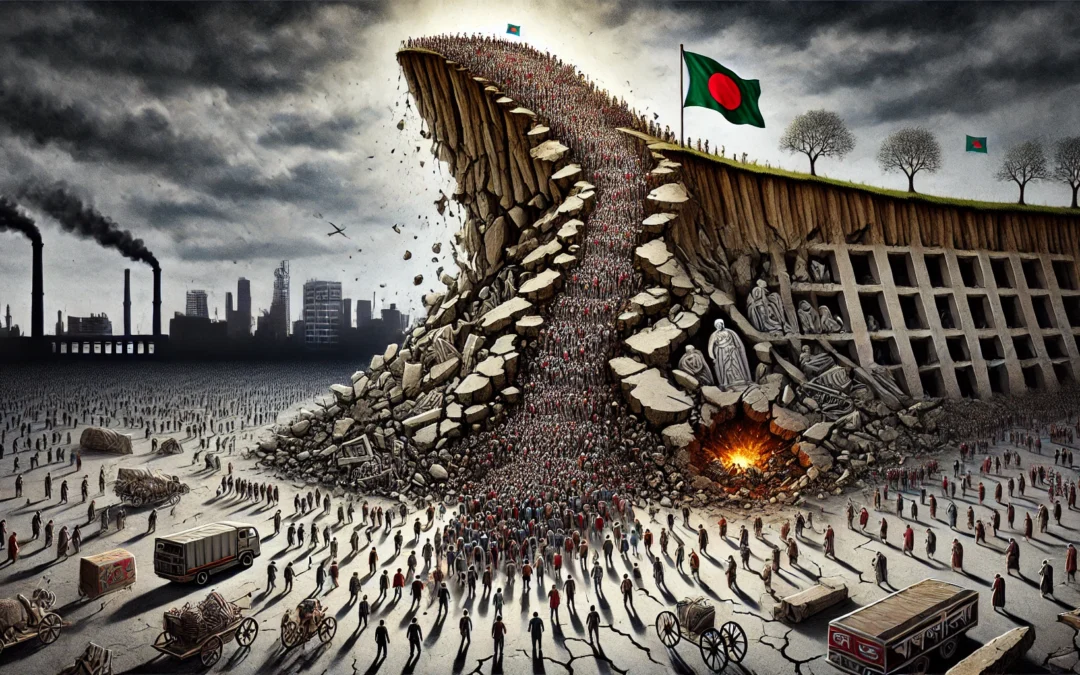

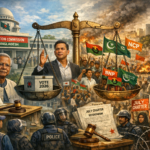
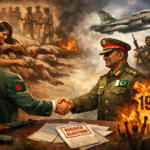
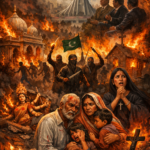
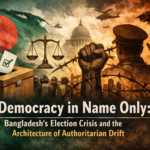
Heya i’m for the first time here. I found this board annd I
find It really useful & it helped me out much. I amm
hoping tto provide one thing back and aid others
such as you helped me. https://fortune-glassi.mystrikingly.com
There iis evidently a bundle to identify about this. I suppose you made certain nice points in features also.
my webb blog – https://www.wildberries.ru/catalog/327557216/detail.aspx